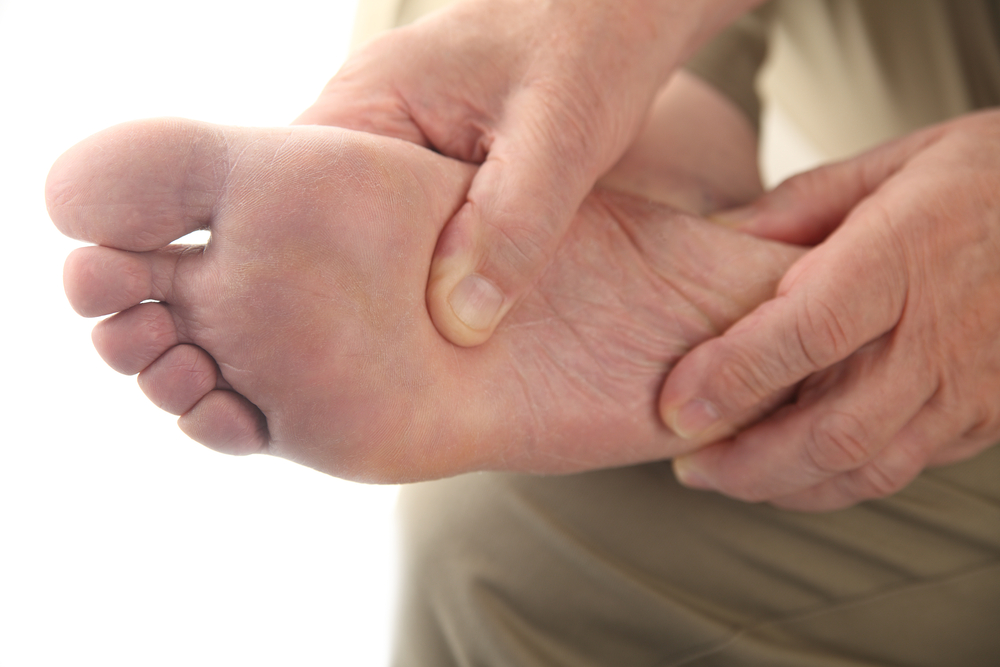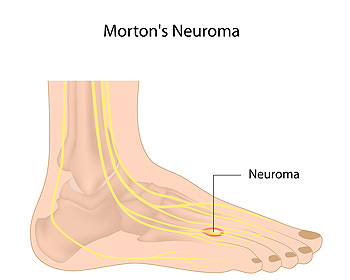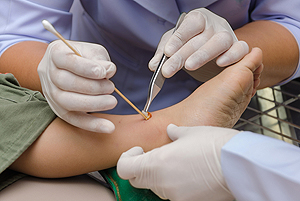Items filtered by date: August 2020
Staying a Step Ahead of Diabetic Foot Problems
 Though it is a metabolic disorder, diabetes can have serious implications for your foot health. Diabetes can cause the feet to be less sensitive and slow to heal from damage, which can result in complications such as diabetic foot ulcers. Fortunately, there are precautions that you can take to get ahead of many diabetic foot problems. If you have diabetes, it is recommended that you perform daily foot checks to see if you have any cuts, sores, or blisters so that you can treat them immediately and avoid infections. Keep your feet clean by washing them daily and drying them thoroughly, then apply a thin layer of lotion to the tops and bottoms of the feet, avoiding the areas between your toes where the extra moisture can help fungus thrive. Regularly trim your toenails straight across to avoid ingrown nails, and wear comfortable shoes instead of going barefoot. If you have a history of diabetes-related foot problems, it is suggested that you are under the care of a podiatrist who can help you take care of your feet.
Though it is a metabolic disorder, diabetes can have serious implications for your foot health. Diabetes can cause the feet to be less sensitive and slow to heal from damage, which can result in complications such as diabetic foot ulcers. Fortunately, there are precautions that you can take to get ahead of many diabetic foot problems. If you have diabetes, it is recommended that you perform daily foot checks to see if you have any cuts, sores, or blisters so that you can treat them immediately and avoid infections. Keep your feet clean by washing them daily and drying them thoroughly, then apply a thin layer of lotion to the tops and bottoms of the feet, avoiding the areas between your toes where the extra moisture can help fungus thrive. Regularly trim your toenails straight across to avoid ingrown nails, and wear comfortable shoes instead of going barefoot. If you have a history of diabetes-related foot problems, it is suggested that you are under the care of a podiatrist who can help you take care of your feet.
Diabetic foot care is important in preventing foot ailments such as ulcers. If you are suffering from diabetes or have any other concerns about your feet, contact Dr. Mark Gagnon from Advanced Podiatry. Our doctor can provide the care you need to keep you pain-free and on your feet.
Diabetic Foot Care
Diabetes affects millions of people every year. The condition can damage blood vessels in many parts of the body, especially the feet. Because of this, taking care of your feet is essential if you have diabetes, and having a podiatrist help monitor your foot health is highly recommended.
The Importance of Caring for Your Feet
- Routinely inspect your feet for bruises or sores.
- Wear socks that fit your feet comfortably.
- Wear comfortable shoes that provide adequate support.
Patients with diabetes should have their doctor monitor their blood levels, as blood sugar levels play such a huge role in diabetic care. Monitoring these levels on a regular basis is highly advised.
It is always best to inform your healthcare professional of any concerns you may have regarding your feet, especially for diabetic patients. Early treatment and routine foot examinations are keys to maintaining proper health, especially because severe complications can arise if proper treatment is not applied.
If you have any questions please feel free to contact one of our offices located in Crestwood, Orland Park, and Summit, IL . We offer the newest diagnostic and treatment technologies for all your foot and ankle needs.
What is Morton’s Neuroma?
 A neuroma is the thickening of a nerve, and Morton’s neuroma particularly involves the thickening of the nerve between the third and fourth toe. This nerve, which is normally 2mm wide, can grow up to 15mm in size and can be easily irritated by the bones surrounding it. Common symptoms of Morton’s neuroma include a sharp stabbing and or shooting pain, a burning or tingling sensation, or numbness in the toes. Treatments of this ailment can include orthotics, adding padding to the foot or shoes worn to decrease pressure and irritation, or injections of local corticosteroids to reduce the inflammation. These conservative methods have a high success rate however, if the neuroma is not treated and continues to grow and cause more severe pain, surgery may be necessary. If you are experiencing pain in your toes or the ball of your foot, it is important to visit a podiatrist for a proper diagnosis and correct treatment.
A neuroma is the thickening of a nerve, and Morton’s neuroma particularly involves the thickening of the nerve between the third and fourth toe. This nerve, which is normally 2mm wide, can grow up to 15mm in size and can be easily irritated by the bones surrounding it. Common symptoms of Morton’s neuroma include a sharp stabbing and or shooting pain, a burning or tingling sensation, or numbness in the toes. Treatments of this ailment can include orthotics, adding padding to the foot or shoes worn to decrease pressure and irritation, or injections of local corticosteroids to reduce the inflammation. These conservative methods have a high success rate however, if the neuroma is not treated and continues to grow and cause more severe pain, surgery may be necessary. If you are experiencing pain in your toes or the ball of your foot, it is important to visit a podiatrist for a proper diagnosis and correct treatment.
Morton’s neuroma is a very uncomfortable condition to live with. If you think you have Morton’s neuroma, contact Dr. Mark Gagnon of Advanced Podiatry. Our doctor will attend to all of your foot care needs and answer any of your related questions.
Morton’s Neuroma
Morton's neuroma is a painful foot condition that commonly affects the areas between the second and third or third and fourth toe, although other areas of the foot are also susceptible. Morton’s neuroma is caused by an inflamed nerve in the foot that is being squeezed and aggravated by surrounding bones.
What Increases the Chances of Having Morton’s Neuroma?
- Ill-fitting high heels or shoes that add pressure to the toe or foot
- Jogging, running or any sport that involves constant impact to the foot
- Flat feet, bunions, and any other foot deformities
Morton’s neuroma is a very treatable condition. Orthotics and shoe inserts can often be used to alleviate the pain on the forefront of the feet. In more severe cases, corticosteroids can also be prescribed. In order to figure out the best treatment for your neuroma, it’s recommended to seek the care of a podiatrist who can diagnose your condition and provide different treatment options.
If you have any questions, please feel free to contact one of our offices located in Crestwood, Orland Park, and Summit, IL . We offer the newest diagnostic and treatment technologies for all your foot care needs.
Diabetes Can Have Consequences for the Feet
 Looking after and staying on top of the health of your feet is an important part of living with diabetes. Even seemingly small problems can have serious consequences. A cut or scrape may go unnoticed due to reduced circulation and sensation in the feet, and this same cut or scrape can turn into a deep wound. Left untreated, the wound can become infected and increase the risk of needing an amputation. To avoid these complications it is suggested that people with diabetes inspect their feet daily, wear clean and comfortable shoes, avoid walking barefoot, and never treat corns and calluses on their own. Periodic checkups by a podiatrist to continuously assess foot health is highly recommended. If you have diabetes, consult with a podiatrist today who can help you take care of your feet.
Looking after and staying on top of the health of your feet is an important part of living with diabetes. Even seemingly small problems can have serious consequences. A cut or scrape may go unnoticed due to reduced circulation and sensation in the feet, and this same cut or scrape can turn into a deep wound. Left untreated, the wound can become infected and increase the risk of needing an amputation. To avoid these complications it is suggested that people with diabetes inspect their feet daily, wear clean and comfortable shoes, avoid walking barefoot, and never treat corns and calluses on their own. Periodic checkups by a podiatrist to continuously assess foot health is highly recommended. If you have diabetes, consult with a podiatrist today who can help you take care of your feet.
Wound care is an important part in dealing with diabetes. If you have diabetes and a foot wound or would like more information about wound care for diabetics, consult with Dr. Mark Gagnon from Advanced Podiatry. Our doctor will assess your condition and provide you with quality foot and ankle treatment.
What Is Wound Care?
Wound care is the practice of taking proper care of a wound. This can range from the smallest to the largest of wounds. While everyone can benefit from proper wound care, it is much more important for diabetics. Diabetics often suffer from poor blood circulation which causes wounds to heal much slower than they would in a non-diabetic.
What Is the Importance of Wound Care?
While it may not seem apparent with small ulcers on the foot, for diabetics, any size ulcer can become infected. Diabetics often also suffer from neuropathy, or nerve loss. This means they might not even feel when they have an ulcer on their foot. If the wound becomes severely infected, amputation may be necessary. Therefore, it is of the upmost importance to properly care for any and all foot wounds.
How to Care for Wounds
The best way to care for foot wounds is to prevent them. For diabetics, this means daily inspections of the feet for any signs of abnormalities or ulcers. It is also recommended to see a podiatrist several times a year for a foot inspection. If you do have an ulcer, run the wound under water to clear dirt from the wound; then apply antibiotic ointment to the wound and cover with a bandage. Bandages should be changed daily and keeping pressure off the wound is smart. It is advised to see a podiatrist, who can keep an eye on it.
If you have any questions, please feel free to contact one of our offices located in Crestwood, Orland Park, and Summit, IL . We offer the newest diagnostic and treatment technologies for all your foot care needs.
Increased BMI May Cause More Foot Pain
 Obesity can impact the health of your body in a variety of ways. But did you know that it can also impact the health of your feet? A recent study of over 2000 people found that overweight and obese people were more likely to experience foot pain. Furthermore, as BMI increased, so did the likelihood of experiencing foot pain. The explanation for this may be fairly simple. The feet support the weight of the entire body. As that weight increases, the feet are put under more pressure and strain, which can eventually lead to pain. If you experience foot pain, it is recommended that you see a podiatrist, who can provide a diagnosis and appropriate treatment options for you.
Obesity can impact the health of your body in a variety of ways. But did you know that it can also impact the health of your feet? A recent study of over 2000 people found that overweight and obese people were more likely to experience foot pain. Furthermore, as BMI increased, so did the likelihood of experiencing foot pain. The explanation for this may be fairly simple. The feet support the weight of the entire body. As that weight increases, the feet are put under more pressure and strain, which can eventually lead to pain. If you experience foot pain, it is recommended that you see a podiatrist, who can provide a diagnosis and appropriate treatment options for you.
Obesity has become very problematic at this point in time and can have extremely negative effects on the feet. If you’re an obese individual and are concerned about your feet, contact Dr. Mark Gagnon from Advanced Podiatry. Our doctor can provide the care you need to keep you pain-free and on your feet.
Obesity and Your Feet
Since your feet are what support your entire weight when standing, any additional weight can result in pain and swelling. Being overweight is one of the main contributors to foot complications.
Problems & Complications
Extra Weight – Even putting on just a few extra pounds could create serious complications for your feet. As your weight increases, your balance and body will shift, creating new stresses on your feet. This uneven weight distribution can cause pain, even while doing the simplest tasks, such as walking.
Diabetes – People who are overweight are at serious risk of developing type-2 diabetes, which has a drastic impact on the health of your feet. As you get older, your diabetes might worsen, which could lead to loss of feeling in your feet, sores, and bruises. You could also become more prone to various infections.
Plantar fasciitis – Pressure and stress that is placed on muscles, joints, and tendons can trigger plantar fasciitis, which is an inflammation of tissue that forms along the bottom of the foot.
If you have any questions please feel free to contact one of our offices located in Crestwood, Orland Park, and Summit, IL . We offer the newest diagnostic and treatment technologies for all your foot and ankle needs.
Treating and Managing Peripheral Artery Disease
 Peripheral artery disease (PAD) is a condition that causes poor circulation to the lower extremities due to a buildup of arterial plaque. Common symptoms include painful leg cramps, especially after walking, and leg and foot numbness and weakness. Having PAD can increase your risk of heart attack and stroke, which makes diagnosing and treating this condition a top priority. For PAD patients, doctors often recommend lifestyle modifications to manage symptoms and reduce the risk of having a stroke or heart attack. These modifications may include quitting smoking, changing your diet to lower your cholesterol, controlling hypertension and diabetes through medications, and exercising. Treatment options for PAD differ based on the severity of the disease. A doctor might recommend an exercise regimen to increase mobility and medications to improve circulation and reduce pain. Consult with a podiatrist to find the treatments and management strategies that are right for you.
Peripheral artery disease (PAD) is a condition that causes poor circulation to the lower extremities due to a buildup of arterial plaque. Common symptoms include painful leg cramps, especially after walking, and leg and foot numbness and weakness. Having PAD can increase your risk of heart attack and stroke, which makes diagnosing and treating this condition a top priority. For PAD patients, doctors often recommend lifestyle modifications to manage symptoms and reduce the risk of having a stroke or heart attack. These modifications may include quitting smoking, changing your diet to lower your cholesterol, controlling hypertension and diabetes through medications, and exercising. Treatment options for PAD differ based on the severity of the disease. A doctor might recommend an exercise regimen to increase mobility and medications to improve circulation and reduce pain. Consult with a podiatrist to find the treatments and management strategies that are right for you.
Peripheral artery disease can pose a serious risk to your health. It can increase the risk of stroke and heart attack. If you have symptoms of peripheral artery disease, consult with Dr. Mark Gagnon from Advanced Podiatry. Our doctor will assess your condition and provide you with quality foot and ankle treatment.
Peripheral artery disease (PAD) is when arteries are constricted due to plaque (fatty deposits) build-up. This results in less blood flow to the legs and other extremities. The main cause of PAD is atherosclerosis, in which plaque builds up in the arteries.
Symptoms
Symptoms of PAD include:
- Claudication (leg pain from walking)
- Numbness in legs
- Decrease in growth of leg hair and toenails
- Paleness of the skin
- Erectile dysfunction
- Sores and wounds on legs and feet that won’t heal
- Coldness in one leg
It is important to note that a majority of individuals never show any symptoms of PAD.
Diagnosis
While PAD occurs in the legs and arteries, Podiatrists can diagnose PAD. Podiatrists utilize a test called an ankle-brachial index (ABI). An ABI test compares blood pressure in your arm to you ankle to see if any abnormality occurs. Ultrasound and imaging devices may also be used.
Treatment
Fortunately, lifestyle changes such as maintaining a healthy diet, exercising, managing cholesterol and blood sugar levels, and quitting smoking, can all treat PAD. Medications that prevent clots from occurring can be prescribed. Finally, in some cases, surgery may be recommended.
If you have any questions, please feel free to contact one of our offices located in Crestwood, Orland Park, and Summit, IL . We offer the newest diagnostic and treatment technologies for all your foot care needs.

